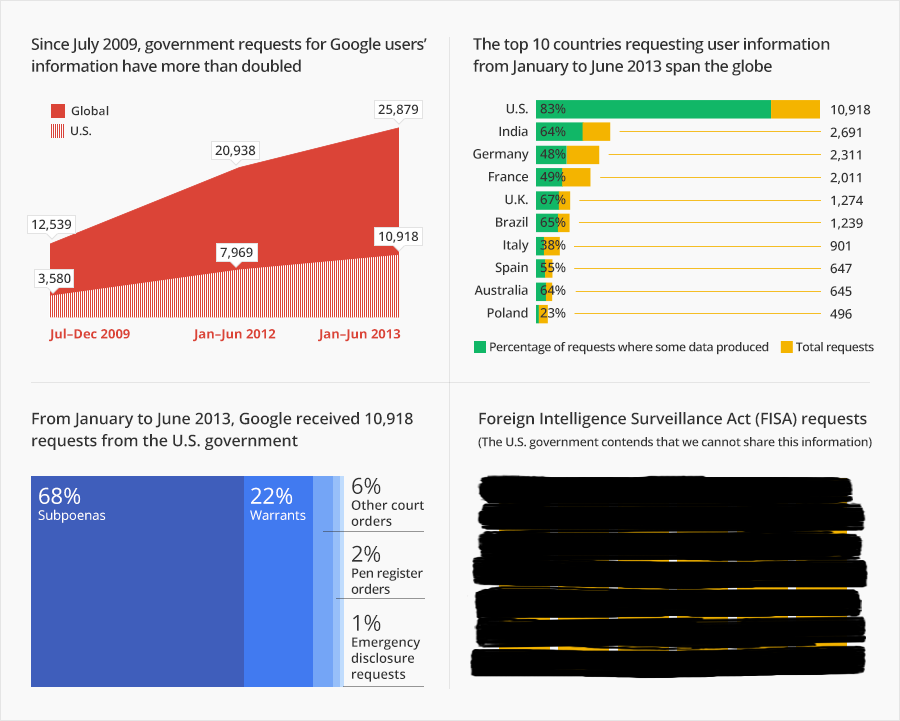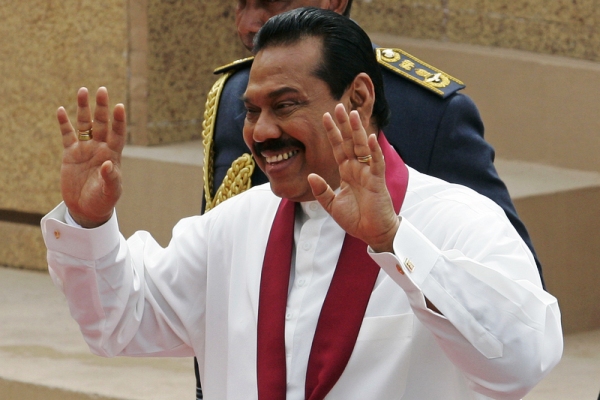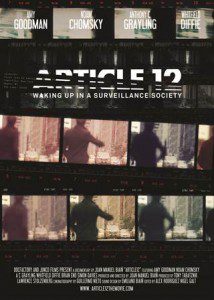14 Nov 2013 | Digital Freedom, News
Google has today released its transparency report for the first half of 2013. There are some interesting figures on government requests for user data in the report. The US leads the way, with 10,918 requests for information about 21,683 accounts, including almost 7,500 requests by subpoena, and interestly, seven for wiretaps (all of which resulted in some data being handed over).
This though, is not the whole story. In a curt blog post (acoompanied by a striking, censored chart), Google’s Richard Salgado pointed out that the company is restricted in what information it can share on some US national security requests, writing:
We want to go even further. We believe it’s your right to know what kinds of requests and how many each government is making of us and other companies. However, the U.S. Department of Justice contends that U.S. law does not allow us to share information about some national security requests that we might receive. Specifically, the U.S. government argues that we cannot share information about the requests we receive (if any) under the Foreign Intelligence Surveillance Act. But you deserve to know.

Other countries in the top tier include Germany, France and the UK leading the way in requests in Europe, and emerging powers Brazil and India making up the top six. The UK saw 1,274 data requests from 1,818 accounts. Brazil had a similar number, with 1,239 requests.
Overall, requests from European governments made up over a third of the worldwide total.
Google has reacted strongly to concerns over NSA and GCHQ surveillance. At a recent meeting in London, the company’s European head of external relations Peter Barron insisted that there was no back door for snooping into Google’s data, and that the company was disgusted by the idea of authorities tapping their cables.
14 Nov 2013 | Events, United Kingdom
In light of the recently passed Californian law allowing minors to delete any of their online activity, Index organised a Google Hangout in association with student newspapers York Vision and The Student Journals, on whether young people should have the right to be forgotten on social media.
Watch the discussion between York Vision editor Patrick Greenfield, Student Journals editor Amy Ashenden and Index’ Alice Kirkland and Milana Knezevic below.
What do you think? Have your say in the comments or tweet us at @IndexCensorship.
14 Nov 2013 | Asia and Pacific, News

President Rajapaksa claims his hands are when it comes to free speech. (Image Chamila Karunarathne/Demotix)
A Channel 4 News team was yesterday barred from travelling to the north of Sri Lanka by a group of angry protesters blocking their train. The pro-government crowd claimed that the reporters were getting money from the Tamil Tigers (LTTE). The crew were eventually escorted out by the police.
Channel 4 News editor Ben De Pear was live tweeting the ordeal. “It seems it is mob rule in Sri Lanka, albeit orchestrated by the authorities to prevent free press access to the north of Sri Lanka,” he posted at the time.
Channel 4 has angered the government of President Mahinda Rajapaksa with a series of documentaries and reports on the alleged of death of some 40,000 Tamils – the figured comes from the UN – in the last weeks of the country’s 30 year long civil war, which ended in May 2009. They have also covered subsequent allegations of human rights abuses like torture and disappearances, levelled at security forces. But De Pear tweeted Rajapaksa had said Sri Lanka is a free country, where you can “go anywhere”.
This comes on the day before the start of the Commonwealth Heads of Government Meeting in the capital Colombo. The biannual summit has been marred by coverage of the continuing poor state of fundamental human rights in the country, with Commonwealth members like India and Canada boycotting in protest. Britain, however, will be attending, with Prime Minister David Cameron stating it is better to confront the country than isolate it. Unlike MPs from Australia and New Zealand on a human rights fact finding mission, who were on Sunday detained and deported, he will presumably be able to enter the country. And with human rights not even on agenda to be formally discussed during the meeting, there are a number of recent issues the Prime Minister can raise in his “serious questions” to President Rajapaksa.
While what has happened to Channel 4 is unacceptable, it is nothing compared to the conditions local journalists work under. Since the murder of Lasantha Wickrematunge in 2009 and the disappearance of cartoonist and columnist Prageeth Eknelygoda in 2010 – neither properly investigated – the country’s media face ongoing repression under the Rajapaksa regime. While freedom of expression is protected in the constitution, little is done to protect it in practise. Intimidation is rife, with journalists attacked and beaten and printing presses destroyed. A recent example was the two-hour long raid on the home of editor and columnist Mandana Ismail Abeywickrema in August. She recently started a journalists’ trade union. Critical reporters have previously been labelled “traitors” by authorities, and at least 26 are currently in exile.
The regime also seems to have a problem with the right to free assembly and civil society gatherings. The vaguely worded 1979 Prevention of Terrorism Act is often used in government crackdowns. Only yesterday, families of disappeared people were barred by the military traveling to a candlelight vigil at an alternative Commonwealth meeting organised by human rights groups in Colombo. One of the conveners of the Alternative People’s Forum, Dr Nimalka Fernando, which is boycotting all official Commonwealth events, was subject to on-air threats from the Chairman of the Sri Lanka Broadcasting Corporation – a state owned radio station.
There is also the case of continuous allegations of torture and forced disappearances levelled at at government and security forces. A recent BBC report by Fergal Keane suggested that while repression has been taking place under successive governments, activists say the situation has worsened under the current regime. A priest who helps victims of torture in the country told the BBC “those who criticise or question the government are being silenced in a very brutal way”.
The government has denied all allegations of human rights abuses, with President Rajapaksa saying today that they ended the killing by defeating the Tamil Tigers. But with the Commonwealth “committed to the Universal Declaration of Human Rights” leaders have a responsibility to hold the Sri Lankan government to account. Hopefully David Cameron’s questions will indeed be serious.
14 Nov 2013 | Events
 To mark Human Rights Day, the United Nations in partnership with DocHouse, present the UK Premiere of ‘Article 12’ – a thought-provoking exposé on our current obsession with voyeurism, surveillance technologies, power and control.
To mark Human Rights Day, the United Nations in partnership with DocHouse, present the UK Premiere of ‘Article 12’ – a thought-provoking exposé on our current obsession with voyeurism, surveillance technologies, power and control.
Featuring leading academic and commentator Noam Chomsky, the film uses the 12th article of the Universal Declaration of Human Rights to confront head on the current state of privacy around the world.
Followed by a Q&A with:
- Juan Manuel Biaiñ – Film Director
- Kirsty Hughes – Index on Censorship, CEO
- Julian Borger – the Guardian, diplomatic editor
Moderated by:
- Orest Nowosad – Chief of Protection, Religion, Accountability and Human Security Section from the Office of the High Commissioner for Human Rights
When: Monday 2nd December
Where: Rich Mix, London
Tickets: Places are limited. It is important to register through Rich Mix’s online system. Click here.



